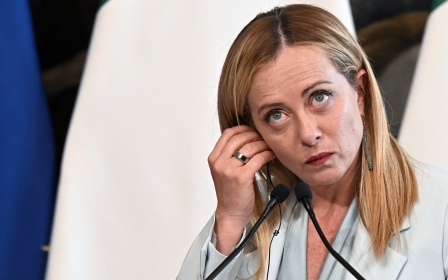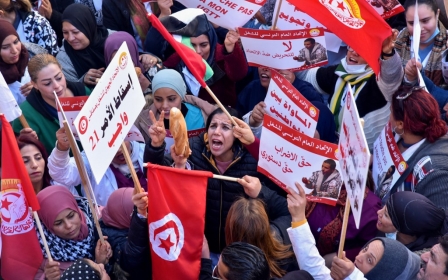Italy: At least 41 people dead after boat travelling from Tunisia sinks off Lampedusa
At least 41 people are believed to have died after a boat sank off the coast of Italy's Lampedusa island on Wednesday, according to local media.
Citing accounts from survivors, the ANSA news agency said four of the people on board told rescuers they were on a boat that had set off from Sfax in Tunisia which sank en route to Italy.
Almost 92,000 people have arrived by sea in Italy this year, according to interior ministry data, compared with around 43,000 in the same period in 2022.
Four survivors, three men and a woman from Ivory Coast and Guinea, told ANSA they were rescued by a cargo ship and then transferred onto an Italian coastguard vessel.
The sinking comes shortly after a migrant ship sank off Tunisia's Kerkennah island last weekend.
New MEE newsletter: Jerusalem Dispatch
Sign up to get the latest insights and analysis on Israel-Palestine, alongside Turkey Unpacked and other MEE newsletters
A judicial official said four people died and 51 were missing after the incident, involving refugees mostly from sub-Saharan Africa.
The Tunisian coastguard recovered 901 bodies of drowned refugees from seas off its coast from 1 January to 20 July this year, the country's interior minister said last month, marking an unprecedented number of victims off the country's shores.
Tunisian President Kais Saied last month signed a Memorandum of Understanding (MoU) with the European Union to curb migration from North Africa.
It was signed in Tunis by European Commission President Ursula von der Leyen, Italian Prime Minister Giorgia Meloni and Dutch Prime Minister Mark Rutte.
Under the agreement, the EU has agreed to supply Tunisia with financial and technical support to deter migration to Europe.
The deal was brokered in part by Meloni, following months of negotiations and an "international conference on development and migration" in Rome.
The deal was struck amid a wave of violence targeting sub-Saharan Africans in Tunisia.
Tunisian security forces expelled hundreds of sub-Saharan Africans to the desert border with Libya last month after violent confrontations in Sfax. Huge numbers are reportedly still stranded in the militarised zone without water.
In February, Saied was widely criticised over incendiary comments in which he claimed that irregular migration from sub-Saharan African countries was being used to transform the demographic make-up of Tunisia.
Middle East Eye delivers independent and unrivalled coverage and analysis of the Middle East, North Africa and beyond. To learn more about republishing this content and the associated fees, please fill out this form. More about MEE can be found here.




